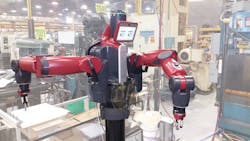Tucked among more than 100 other various machines on the Standby Screw floor in suburban Cleveland are a pair of cooperative robots. Both are Baxters from Rethink Robotics, an American company headquartered in Boston, and both wield their arms in the same controlled motion, again and again, close to a million times every calendar year. They are as efficient as human workers, and they are far cheaper.
The Baxters have not replaced any human workers at Standby, though, and they won't — not now, and not in the future, according to COO Bill Marcell and project manager Jess Horvath. In fact, Standby plans to add more robots to its floor and keep every human worker, even if they have to slide into new positions.
They will not let robots displace, replace or usurp the humans who have helped them grow these last 76 years.
Only time will tell, of course, if the rest of the country and the world does the same.
The number of industrial robots in 17 major developed countries including the United States increased by more than 150% from 1993 to 2007, but had no effect on the hours worked by high-skilled workers, according to "Robots at Work," a paper by Georg Graetz of Uppsala University and Guy Michaels of the London School of Economics that was published in March. There was some evidence they cut into the hours of low- and middle-skilled workers, though they didn't have any significant effect on overall employment.
Another 2015 paper, "Robots Are Us: Some Economics of Human Replacement," meanwhile, forecasts a workplace filled with increased automation and posits a wage bubble that could result in "a long-run decline in labor share of income, tech-booms followed by tech-busts, and a growing dependency of current output on past software investment." The four authors of that paper, published by the National Bureau of Economic Research, concluded that without "appropriate fiscal policy that redistributes from winners to losers," robots and other "smart machines can mean long-term misery for all."
Tim Criswell, senior vice president of innovation and technology development at Wynright Corp., a manufacturer of material handling equipment, forecasts a future far closer to the former scenario.
"There's always the concern, when robots come in, that workers expect to lose their jobs," he says. "My experience has been the opposite. The automation is put in very repetitive, physically demanding positions." The robots are able to maintain the level of performance, he says, and humans, who have a finite period of peak performance, shift their skills toward other positions. Robots replace labor, not brains.
Automation has its place on the floor, and that place is increasing with every technological advancement, but can robots ever totally replace humans? Ignore Hollywood when you answer that question, and pay attention to Marcell, Horvath and Criswell. Robots are here for good, sure, and so are their human overlords.
About the Author
Matt LaWell
Staff Writer
Staff writer Matt LaWell explores news in manufacturing technology, covering the trends and developments in automation, robotics, digital tools and emerging technologies. He also reports on the best practices of the most successful high tech companies, including computer, electronics, and industrial machinery and equipment manufacturers.
Matt joined IndustryWeek in 2015 after six years at newspapers and magazines in West Virginia, North Carolina and Ohio, a season on the road with his wife writing about America and minor league baseball, and three years running a small business. He received his bachelor's degree in magazine journalism from Ohio University.
